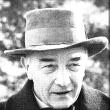Biography
Robert Musil was born the son of Alfred Musil and his wife Hermine in Klagenfurt on November 6, 1880. His father was a professor of engineering at the German Technical University in Brno. At the age of 12, Musil was sent to military boarding school first at Eisenstadt and later at Mährisch-Weisskirchen before he went to the Technical Military Academy of Vienna in 1897.
Not wanting to spend his life in the military, Musil switched to engineering, following in the footsteps of his father. Yet he felt strongly drawn to literature and philosophy and was an avid reader of Nietzsche, Dostoyevsky, Ralph Waldo Emerson, and Ernst Mach. After passing his second engineering examination, he abandoned engineering in order to study philosophy, mathematics, and psychology at the University of Berlin. He earned his doctorate in 1908.
In 1906, Musil published his first novel, entitled Die Verwirrungen des Zöglings Törless. In this book Musil delineated his own experience as a young cadet in military school. He depicted adolescent self-discovery and the awakening sense of power among young aristocrats who started abusing and mistreating their weaker fellow students.
Musil turned down an academic position at the University of Graz in order to devote all of his time to his literary endeavors. In 1911, he published Vereinigungen. In order to support his new wife Martha Marcolvaldi and her two children, he decided to take on the position of a librarian at the Technical University in Vienna. He also started working as an editor for the Berlin Literary Journal and wrote the play Die Schwärmer.
During World War I, Musil served in the Austrian Army and was almost killed by an Italian plane in 1915. He would depict this experience later in his short story Die Amsel. In 1916 and 1917 he was editor of the Soldaten Zeitung. After the end of the war and the collapse of the Habsburg Empire, Musil returned to his life as a writer, publishing Drei Frauen in 1924, and in 1930 and 1932 the first two volumes of his masterpiece, Der Mann ohne Eigenschaften. He received the Kleist-Preis in 1923, the Kunstpreis der Stadt Wien in 1924, and the Gerhart-Hauptmann-Preis in 1929.
Musil’s last years were tainted by World War II and the National Socialists. After Austria’s annexation in 1938, he fled his country and settled in Switzerland, where he lived in abject poverty. He continued working on Der Mann ohne Eigenschaften, but never completely finished it.
On April 15, 1942, he died of a stroke at the age of 61.
-Gabi Eichmanns-
![]()
